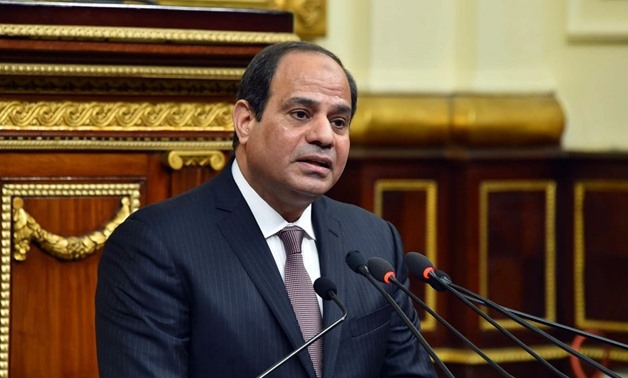
FILE - President Abdel Fatah al-Sisi
CAIRO - 19 November 2018: A celebration was held on Monday in the occasion of the birthday of Prophet Mohammed and attended by President Abdel Fatah al-Sisi, ministers, and clerics. The speeches in the event focused on Sunna which is all statements and actions by the prophet.
Criticism of Sunna Doubters
Grand Imam of al-Azhar Sheikh Ahmed al-Tayeb refuted the discourse doubting Sunna, and its tellers. He said that the idea had first appeared in India in the 19th century by individuals who were affiliated with the British Colonization, and others who ended up by either claiming to be prophets or calling for discarding Sunna altogether.
The Grand Imam asserted that many clerics concluded that Sunna constitutes 75 percent of the religion. As Sunna determines how to perform prayers, when one of those who call for deserting Sunna was asked how Muslims should pray, he replied that the ruler should develop a method for prayers. The Grand Imam stated that example expressing his dismay.
“That idea was introduced in Egypt by a doctor in Torra prison as he published two articles on the topic in Al Manar magazine harnessing support by some writers. What is common among those (individuals) is doubting tellers of Sunna, and disregarding their massive efforts,” the Grand Imam said.
The Grand Imam stressed that “Isnad theory,” which is the method in which Hadith was passed down through generations and referenced, is “exclusive to Islam” citing the praise of some “orientalists.”
“The prophet is the only one (among God messengers) whose life details were documented,” the Grand Imam affirmed. Tayeb cited a “valid” Hadith in which the prophet warned that some “rich people” would initiate in the future such calls. “That’s a miracle and a proof of his prophecy,” Tayeb concluded.
Religious Discourse Modernization
The prophet emphasized that all humans deserve a decent life regardless of their race, religion and gender, and that Quran stated that all “peoples” should understand each other, the president said. The prophet stated that “there should be no obligation in religion,” President Sisi added saying that some by contrast have adopted extremism breaching the teachings of Quran and Sunna.
“It’s important to rectify wrong (religious) concepts. Let’s restore our values embodied in tolerance, and devotion to work in order to confront those promoting extremism and terrorism,” President Sisi stressed highlighting that “development is a strategic goal of the state.”
“We need to review our cultural legacy in an illuminated way and extract what fits our life. Let’s save minds from their bewilderment, and souls from their oblivion. Let’s give up hatred, violence, and grudge,” President Sisi emphasized.
“Let’s restore the position of our homeland as a center of science and culture to all humanity, and let’s revive decency and virtue in our country,” President Sisi said.
“The current dilemma worldwide is not about following Sunna or not. It is about the wrong understanding of our religion. Are those calling for the abandonment of Sunna more wrongful than those who misinterpreted our religion? How is Muslims’ reputation globally?,” President Sisi commented in Egyptian Arabic after finishing his formal speech. The president also criticized those who label modernization calls “conspiracy.”
“Religion is about manners. I encounter bizarre things while ruling the country,” President Sisi stated questioning the absence of “honesty, respect, mercy, and work ethics.”
“The sources of knowledge influence the way of thinking. Those having religious, economic, or legal backgrounds have different ways of thinking. A cleric must have a comprehensive approach. However, clerics think in one direction,” President Sisi said.
“We train youth in the National Academy (for Youth Training and Rehabilitation) to think about all aspects of matters. You need to think about those (points),” President Sisi concluded.
The president awarded a number of clerics for their outstanding achievements in the preaching field including the muftis of Uganda, and Kazakhstan.
Charity
Minister of Endowments Mohamed Mokhtar Gomaa highlighted that the prophet said that thanking people for their help and cooperation is a way of expressing gratitude to God, and that he urged Muslims to share their “blessings” with others.
The minister thanked the president for his call to modernize the religious discourse saying that such task is a dynamic process requiring the contributions of intellects and clerics.
The official highlighted that clerics distinguished the difference between religious teachings by the prophet directed to his companions, and general religious teachings whose interpretation is determined by the time, and place of a given state.
The minister revealed that the establishment of an academy to train male and female preachers is underway. The cost of the project is LE100 million ($5.6 million) and will be built over an area of 11,000 square meters in 6th of October City. It will have translation, and computer labs as well as dorms.
The official said that LE350 million ($20 million) of endowments revenues went to charity in 2018. That is double the precedent year. He explained that LE100 million were contributed to the “Decent House” initiative by the Ministry of Solidarity targeting poor families.
The same amount was donated to education, while LE25 million were used to purchase “Aman” insurance for “breadwinning women” who are in full charge of the financial responsibilities of their families. The rest was used to build residential units in rural areas including 4,920 units in Aswan governorate.
The minister handed the president copies of the most recent books published within the framework of religious discourse modernization. Those are titled “Understanding the Meaning of the Prophet’s Sunna” and “The Critical Thinking between Legacy and the Present.”

Comments
Leave a Comment